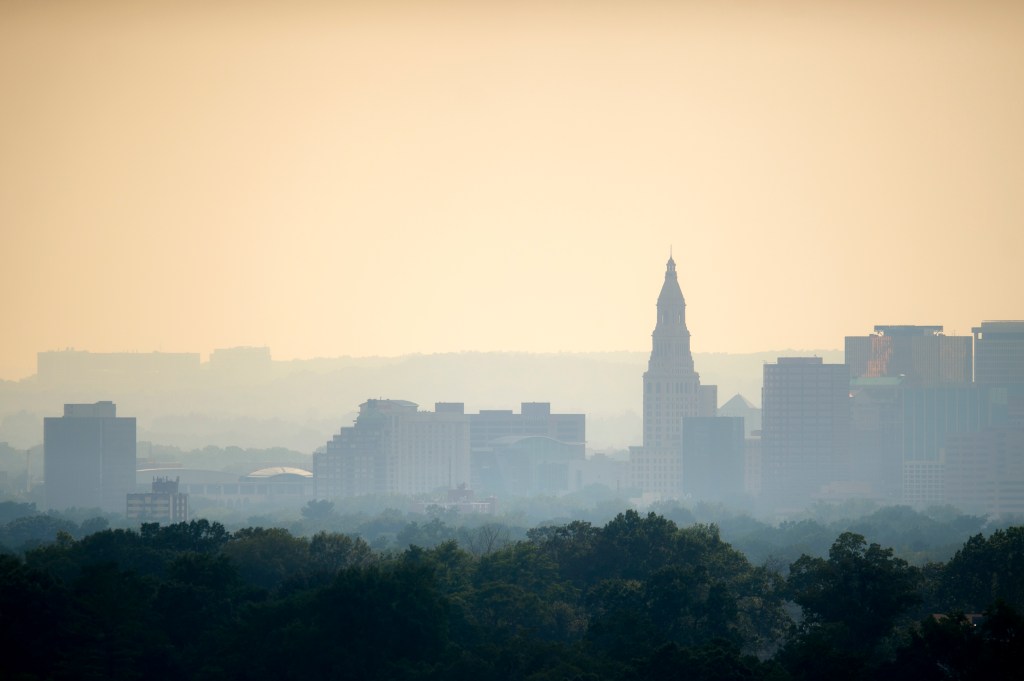Here we go again with arguments that clean air hurts economic growth.
This time, the new EPA “finding” is rooted in a recent Department of Energy report by a small cherry-picked group of scientists disputing the connection between burning fossil fuels and climate change. A connection that is supported by voluminous real scientific evidence from researchers around the world.
Really dirty air lives in CT. Data shows some areas still face far worse pollution than others.
In so many ways, we shouldn’t be surprised at this latest announcement coming from the Trump EPA, led by Lee Zeldin, a former supporter of climate change action turned Trump acolyte. In making this announcement, Zeldin called the proposed policy change the “largest deregulatory action in the history of the United States.” Perhaps Zeldin is correct in the scale of the deregulation. But the lie is in linking environmental deregulation and sluggish economic growth, a linkage proven wrong in recent decades, especially in Connecticut.
For most of my adult life, I have heard the Republican Party tout the positive impact of deregulation of all sorts on economic growth. This was a favorite turn of phrase for Ronald Reagan, but we’ve heard it from both Bush’s, the current White House resident and so many more. It is an ingrained part of the Republican script every election and almost daily in between.
But this long-running talking point rings hollow is so many instances and especially in the current one. For at least three decades, as the science has mounted about climate change and its causes, climate change resistors have done their very best to slow action because, they argue, greenhouse gas reductions will limit the economy’s ability to produce and sell goods and services cheaply and for a profit. The excuses have run from “we don’t low cost alternative fuels to oil and gas to run our mills yet” to “green technologies are still too costly for consumers” and the weasel argument of “we need oil and gas as our bridge fuels until we can mass produce clean energy.”
While each of those arguments has a kernel of truth, they never address the reality that we need to invest in renewable energy because fossil fuels will eventually go away. And as most of us know from our daily lives where technologies like solar, geothermal, and wind are everywhere, including many of our backyards.
The emotional toll of climate change is broad-ranging, especially for young people
Perhaps even more importantly, however, is that actions like those from the EPA will take us back to a time of unfettered air pollution in the US. As someone who grew up in the 1970s in Bethlehem, Penn., I can attest first-hand to the impact that the Clean Air Act had on cleaning up Bethlehem’s air and the red-dusted houses on the south side near Bethlehem Steel’s home plant. Do we really want to go back to those times? The proposed EPA policy sets our country back on that very dirty and unhealthy track. And this doesn’t even include the hazards from severe weather and flooding that will only be made worse by ignoring the reality of greenhouse gas impacts.
It’s even more troubling (and wrong) when we have tangible evidence that the pursuit of a clean environment and economic growth can go hand in hand. Connecticut is a perfect case in point. In the early 2000s, a group of pro-growth environmental activists used scientific evidence to convince two Republican governors to shift their approaches to greenhouse gas emissions and set our state on a course of national leadership in this policy area. The adoption and implementation of this pro-growth environmental policy in Connecticut under Jodi Rell showed that clean air could help a state’s economy grow. Clean air leads to fewer sick days from illnesses like asthma and reduces other health conditions among Connecticut’s working-age population and thus increases productivity for that workforce.
As the Republicans in the state understood that cost calculation and saw its actual impact, other states followed. California moved similarly and ultimately more deeply than Connecticut did. All the while, the battle against climate change action was waging in lots of other parts of the country. But the federal government largely turned a blind eye to state level activity until Trump’s attack on rational, science-based climate policy.
So today, we are faced with proposed policy action that will turn the pollution clock back to the 1960s where smoke spewed everywhere. This certainly isn’t a world that I want to inhabit again. Bethlehem in the early 1970s was enough for me.
So where does hope lie for clean breathing, healthy living and economic growth? Possibly with the Supreme Court, although their recent willingness to overturn precedent doesn’t bode well there. But if they follow tradition, the court should rule against the new EPA proposal as it clearly violates Massachusetts v. EPA (2007), which declared greenhouse gases as criteria pollutants. As a result, greenhouse gases must be regulated by EPA under the provisions of the Clean Air Act of 1970.
I don’t know how much faith in the courts I have left right now. But after the recent vaccine decisions, new “reports” on climate change causality, and the general rejection of science over the past six months, it’s what I have left to hang my hat on at the moment. One can always hope that sanity and real science will prevail.
Dr. Mark A. Boyer is a Board of Trustees Distinguished Professor (emeritus) in the Department Geography at UConn. His most recent book is “Global Politics”, published by Oxford University Press.
